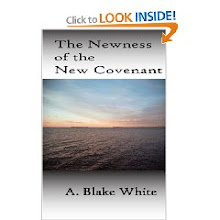Laurelville Family Conference
Fred Zaspel
Session #4: Selected Scriptures, “Eternal Life”
Began by reading John 17:1-3 and followed this by prayer. Salvation is an important term in our Christian vocabulary, but it is used little in the vocabulary of our Lord. The word Jesus used more than others to describe salvation is the expression “eternal life”.
Few statistics… 1) never uses it Mt. or Mk., 2) once in Lk., 3) once in John, 4) “save” is used a dozen times in the Synoptics. 1) eternal life used 53 times in Jn. (noun and verb), 2) 17 times in Revelation (total 97 times).
John 3:16 uses “eternal life”. At the end of John’s book (20:31), he tells us his purpose- that you may have eternal life. In John 17 Jesus says, “that I may give eternal life to those you have given me”.
This is not to say that “salvation” is a bad term- we have been rescued from sin. But Christ preferred to use “eternal life”, therefore Jesus communicating that our salvation is more than just rescue. Jesus is stressing the blessedness of salvation beyond “rescue”.
I. What is the significance of “eternal life”?
1) It’s a little too soon to be talking about it (eternal life). “Eternal life” is used to describe the age of the resurrection- the eschaton, the age to come (Dan. 12:2; Mt. 25:46; Mk. 10:17; Jn. 12:25, 5:28-29,10:10). In the day of resurrection we will experience the blessedness of heaven. That is our hope. Thus, it’s a little too soon to talk about this. Jesus also speaks about “eternal life” being now (Jn. 5:24-25)- that day has come, “crossed over from death to life”. The day “has now come”. So, there exists an “already/not yet tension. The blessedness of the eschaton becomes a present possession for us- “the future is brought to the present”. This is not abstract theology. We feel being pulled in two directions- “we’ve tasted glory and we are there, and, on the other hand, we are not there”. “We have entered into the glory of the age to come and begun to taste it already.”
2) This has implications to do with the security of the believer. We are secure being brought into eternal life ahead of time. That is why Paul can say that we are citizens of heaven.
II. What is it about the age to come (eternal life) that makes it such a blessed experience?
To know God in fellowship (Jn. 17:3). We are created with a capacity to know God and we find this in Adam until the separation of fellowship because of sin. Our whole problem because of sin is “that we don’t know God” (cf. Acts 17). Eternal life brings us into fellowship of God. Every man searches for this void to be filled naturally. Sin keeps us from experiencing the blessedness for which we were created. Thus, very early on God communicates His goal to restore this fellowship with man. Christ has come to fill the void- give eternal life…”that they may know God Himself through His Son Jesus Christ”.
Our life really began when we came to know Christ. People recognize us not, believing that we come from another planet. And that is true. We belong to the future. There is a joy unaffected by circumstances- this is eternal life. The first question of Westminster Catechism…”chief end of man is to glorify God and enjoy Him forever”…puts it well. This is what we are created for.
Fred closed his message with a plea to come to Christ- “you don’t have a clue and you don’t know what you are missing” by not coming to Christ.
Monday, August 17, 2009
Subscribe to:
Post Comments (Atom)








No comments:
Post a Comment